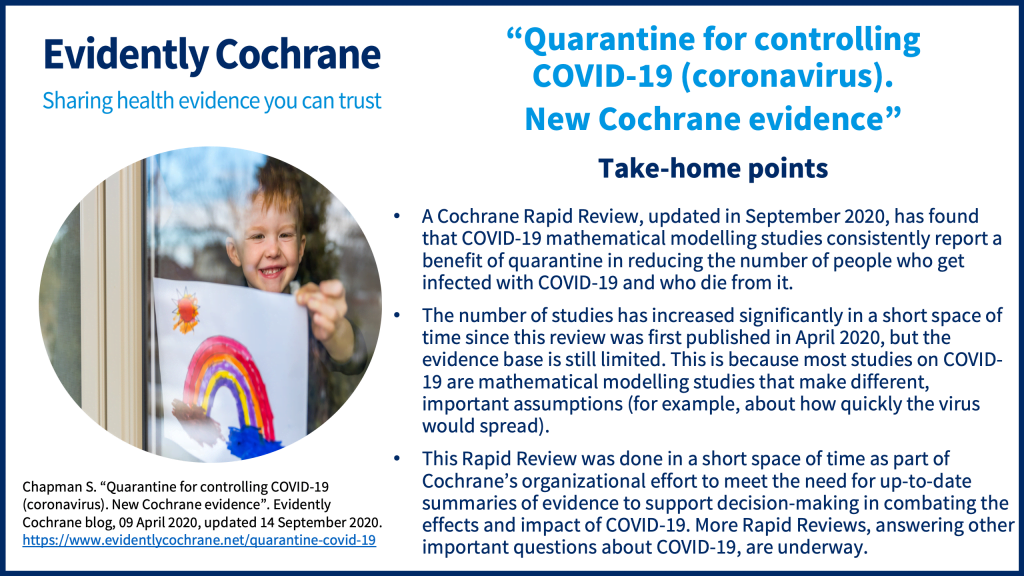Sarah Chapman looks at a Cochrane Rapid ReviewA rapid review is a simplified systematic review that can be done in a few weeks to produce timely evidence for decision-making., updated in September 2020, with evidence on the effectivenessThe ability of an intervention (for example a drug, surgery, or exercise) to produce a desired effect, such as reduce symptoms. of quarantine for controlling the spread of COVID-19 (coronavirus).
Page updated in September 2020 and checked 26 June 2023.
Take-home points

In March 2020, I blogged about two rapid reviews by researchers at King’s College London on what makes people more likely to follow quarantine rules and what makes it more tolerable . In April 2020, Cochrane published Quarantine alone or in combination with other public health measures to control COVID‐19: a rapid review. This review was updated on 14th September 2020, to take account of the latest evidence.
What is quarantine?
All over the world, public health measures are in place with the aim of reducing the spread of COVID-19, a new virus that spreads quickly and for which there is not yet an effective treatmentSomething done with the aim of improving health or relieving suffering. For example, medicines, surgery, psychological and physical therapies, diet and exercise changes. or vaccine. These measures include physical distancing (also called social distancing), isolation and quarantine. Quarantine is the separation and restriction of movement of people who have potentially been exposed to a contagious disease, in order to limit its spread. It can be applied to individuals or whole communities. It can be voluntary or enforced.

What did the researchers want to find out?
They wanted to know how well quarantine works in limiting the spread of COVID-19 and if it reduces the number of deaths from the disease. They also wanted to know if quarantine is more effective if it is done along with other things such as closing schools, social distancing and travel restrictions.
What sort of evidence is this?
A Cochrane Rapid Review
Like all Cochrane ReviewsCochrane Reviews are systematic reviews. In systematic reviews we search for and summarize studies that answer a specific research question (e.g. is paracetamol effective and safe for treating back pain?). The studies are identified, assessed, and summarized by using a systematic and predefined approach. They inform recommendations for healthcare and research., this Cochrane Rapid Review is a systematic reviewIn systematic reviews we search for and summarize studies that answer a specific research question (e.g. is paracetamol effective and safe for treating back pain?). The studies are identified, assessed, and summarized by using a systematic and predefined approach. They inform recommendations for healthcare and research. that brings together the best available evidence from research studies relevant to the review’s question(s). However, it follows a shorter process than usual in the interests of providing evidence quickly. It was commissioned by the World Health Organization and has been done as part of Cochrane’s organizational effort to meet the need for up-to-date summaries of evidence to support decision-making in combating the effects and impact of COVID-19 .
Mostly based on mathematical modeling studies
The review includes 51 studies, of which 32 focused on COVID-19. Seventeen of the studies looked at SARS (severe acuteA health condition (or episodes of a health condition) that comes on quickly and is short-lived. respiratory syndrome), alone or with other viruses, and two looked at MERS (Middle East respiratory syndrome). As such, these provide only indirect evidence for our current situation with COVID-19.
It is important to note that the evidence in this review mostly comes from modeling studies that show how quarantine affects the spread of COVID-19. Only four of the COVID-19 studies observed the actual effects of quarantine (on 6064 people in China, Greece and Singapore). The other 28 COVID-19 studies were modeling studies, simulating outbreaks in various countries, on a cruise ship, or in the general populationThe group of people being studied. Populations may be defined by any characteristics e.g. where they live, age group, certain diseases.. The models in the studies are based on a number of assumptions (for example, about how quickly the virus would spread) and their accuracy won’t be fully known until later.
Neil Ferguson, a mathematical epidemiologist at Imperial College London, and lead author of one of the COVD-19 studies included in the review, has reflected on limitations of modeling studies. He pointed out that “We’re building simplified representations of reality. Models are not crystal balls”.
When we have more information about the virus, from the COVID-19 pandemic, the results of modeling studies may look different. So the Cochrane authors rateThe speed or frequency of occurrence of an event, usually expressed with respect to time. For instance, a mortality rate might be the number of deaths per year, per 100,000 people. their confidence in the results to be low or very low.
What’s the bottom line?
The COVID-19 modeling studies in the review consistently report a benefit of quarantine in reducing the number of people who get infected and who die from COVID-19. The studies on SARS and MERS have similar results.
What else does the evidence suggest?
The Cochrane authors also found that putting quarantine in place early and combining it with other public health measures (such as social distancing) seem to be important if it is to be effective in controlling the spread of disease. Early quarantine measures may also mean greater cost-savings are made. The effect of quarantining of travelers from a country with a declared outbreak to reduce disease transmission and deaths may be small, but the evidence is very uncertain.
In a press release, lead author Barbara Nußbaumer-Streit talked about the limitations of the evidence: “We published the first version of this review in April 2020. Since then 22 additional studies on quarantine for COVID-19 have become available. While the number of studies has increased significantly in a short space of time, the evidence base is still limited because most studies on COVID-19 are mathematical modelling studies that make different assumptions on important model parameters. The evidence suggests that implementation of quarantine early on in a pandemic and combining quarantine with other public health measures such as physical distancing, can help slow the spread of COVID-19. However, it is difficult to determine what combination of measures is the best to reduce the number of cases and deaths.” Watch a video of the lead author summarising the review’s findings.
On this page, which is constantly updated, you can stay informed about Cochrane content relating to the coronavirus (COVID-19) pandemic and the various related activities that Cochrane is undertaking in response.
Join in the conversation on Twitter with @CochraneUK @SarahChapman30 or leave a comment on the blog. Please note, we cannot give specific medical advice and do not publish comments that link to individual pages requesting donations or to commercial sites, or appear to endorse commercial products. We welcome diverse views and encourage discussion but we ask that comments are respectful and reserve the right to not publish any we consider offensive. Cochrane UK does not fact check – or endorse – readers’ comments, including any treatments mentioned.
Sarah Chapman has nothing to disclose.



Sin lugar a dudas que la cuarentena es una medida para frenar el contagió, pero no se podrá mantener la misma de una forma ilimitada, debe estar acompañada de un análisis de los posibles contagiados, y permitir que aquellos que evolucionaron satisfactoriamente de la enfermedad formen el escudo de protección y se incomporen al trabajo para normalizar la actividad económica pues, el hambre es la mejor aliada de las pestes , y tambien traera muertes.
Por el momento no existe evidencia de inmunización resultante de la superacion de la enfermedad. Aun los recuperados, siguen suceptibles a posterior contagio e infeccion.